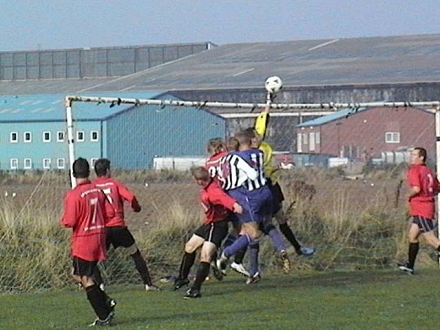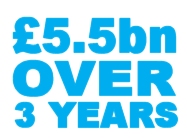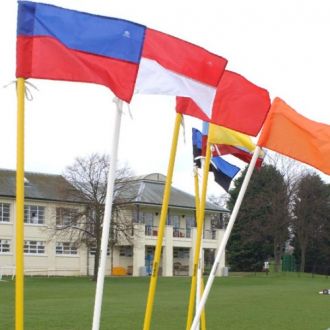From Premier League to Sunday League - Football Finances Explained
We take a look at the finances of Premier League football clubs compared to those of a typical Sunday League side.
Millions of Manchester United fans from around the world breathed a collective sigh of relief when it was announced recently that Wayne Rooney had committed his long-term future to the club. However, his reported £300,000-per-week salary means he will earn more in one month than many of United’s fans earn during their entire lifetime. The working man’s game is becoming farther and farther removed from reality, and nowhere is that more apparent that at grassroots level.
The chasm between the haves and have-nots in British football is growing wider every year. And while this may be great news for the elite players, club owners and the people who run the game, it may spell the end of the ordinary fan’s involvement in the game. While fans have seen their salaries stagnate during recent years, the bloated coffers of the English game have swelled to unprecedented levels. And as our children and amateur players have struggled with dilapidated facilities and rotting pitches, the game’s elite clubs have seen their turnovers soar. This is clearly a situation that is not sustainable.
Like most 21st-century businesses, the Premier League relies on perpetual growth. Investment, wage levels and transfer fees are growing at astonishing rates, and combined with UEFA’s fair play rules, the need for ever-increasing revenues is as great as ever. However, with season tickets costing some fans nearly £2,000 a year, and the privilege of watching live football on the TV costing more than £500 a year, the fans are in danger of being priced out of the game completely – and that could spell disaster for many clubs.
In order to demonstrate the huge disparity that now exists between both ends of the footballing spectrum, comparing the Premier League with a typical Sunday league in the Blackpool area effectively presents the stark and shocking facts.
 Affiliated to the Lancashire Football Association, and in turn the Football Association, the BFSFA is home to 63 Sunday league teams – a number which is half the peak of 128 registered teams during the league’s 1980s heyday. Run by a committee of 11 volunteers, this local league has been an integral part of amateur football in the local community since the 1960s, and it provides a competitive platform for more than 1,000 players in and around Blackpool.
In order to qualify for entry into the league each season, teams must be able to register a full squad by 1st August. They must also be able to supply their own match balls, kits, corner flags and nets. In addition, a registration fee of £50 is payable by all new teams, and every team needs to pay an insurance fee of £26 before the start of the season. Teams must become affiliated to the Lancashire Football Association at a cost of £85, and annual league fees of £160 per year are required. Council pitch fees cost £440 per year, while referees cost £25 per match – payable by the home team (linesmen are optional extras!)
So, a Sunday league team competing in the BFSFA will incur the following costs
Affiliated to the Lancashire Football Association, and in turn the Football Association, the BFSFA is home to 63 Sunday league teams – a number which is half the peak of 128 registered teams during the league’s 1980s heyday. Run by a committee of 11 volunteers, this local league has been an integral part of amateur football in the local community since the 1960s, and it provides a competitive platform for more than 1,000 players in and around Blackpool.
In order to qualify for entry into the league each season, teams must be able to register a full squad by 1st August. They must also be able to supply their own match balls, kits, corner flags and nets. In addition, a registration fee of £50 is payable by all new teams, and every team needs to pay an insurance fee of £26 before the start of the season. Teams must become affiliated to the Lancashire Football Association at a cost of £85, and annual league fees of £160 per year are required. Council pitch fees cost £440 per year, while referees cost £25 per match – payable by the home team (linesmen are optional extras!)
So, a Sunday league team competing in the BFSFA will incur the following costs
 These enormous figures are also having an inflationary effect on player values. In search of bargains, a growing number of clubs are turning to foreign leagues for player acquisitions – a phenomenon that is limiting opportunities for young English players. Unless the huge gap between the game’s giants and minnows can be narrowed, it seems that the England national team may be destined for a future in the third tier of the international game. Perhaps more worrying, however, is the fact that our youngsters are being priced out of every level of the national game.
These enormous figures are also having an inflationary effect on player values. In search of bargains, a growing number of clubs are turning to foreign leagues for player acquisitions – a phenomenon that is limiting opportunities for young English players. Unless the huge gap between the game’s giants and minnows can be narrowed, it seems that the England national team may be destined for a future in the third tier of the international game. Perhaps more worrying, however, is the fact that our youngsters are being priced out of every level of the national game.
The Premier League’s Finances
 During the period between 2010 and 2013, the Premier League grossed £1.4 billion in TV rights in foreign markets alone. However, overseas TV deals between 2013 and 2016 are expected to top £2 billion. And when that figure is added to the domestic deals with the BBC, Sky and BT, the Premier League can expect an income from global TV rights of at least £5.5 billion during the next three years.
During the period between 2010 and 2013, the Premier League grossed £1.4 billion in TV rights in foreign markets alone. However, overseas TV deals between 2013 and 2016 are expected to top £2 billion. And when that figure is added to the domestic deals with the BBC, Sky and BT, the Premier League can expect an income from global TV rights of at least £5.5 billion during the next three years.
The Blackpool and Fylde Sunday Football Alliance
 Affiliated to the Lancashire Football Association, and in turn the Football Association, the BFSFA is home to 63 Sunday league teams – a number which is half the peak of 128 registered teams during the league’s 1980s heyday. Run by a committee of 11 volunteers, this local league has been an integral part of amateur football in the local community since the 1960s, and it provides a competitive platform for more than 1,000 players in and around Blackpool.
In order to qualify for entry into the league each season, teams must be able to register a full squad by 1st August. They must also be able to supply their own match balls, kits, corner flags and nets. In addition, a registration fee of £50 is payable by all new teams, and every team needs to pay an insurance fee of £26 before the start of the season. Teams must become affiliated to the Lancashire Football Association at a cost of £85, and annual league fees of £160 per year are required. Council pitch fees cost £440 per year, while referees cost £25 per match – payable by the home team (linesmen are optional extras!)
So, a Sunday league team competing in the BFSFA will incur the following costs
Affiliated to the Lancashire Football Association, and in turn the Football Association, the BFSFA is home to 63 Sunday league teams – a number which is half the peak of 128 registered teams during the league’s 1980s heyday. Run by a committee of 11 volunteers, this local league has been an integral part of amateur football in the local community since the 1960s, and it provides a competitive platform for more than 1,000 players in and around Blackpool.
In order to qualify for entry into the league each season, teams must be able to register a full squad by 1st August. They must also be able to supply their own match balls, kits, corner flags and nets. In addition, a registration fee of £50 is payable by all new teams, and every team needs to pay an insurance fee of £26 before the start of the season. Teams must become affiliated to the Lancashire Football Association at a cost of £85, and annual league fees of £160 per year are required. Council pitch fees cost £440 per year, while referees cost £25 per match – payable by the home team (linesmen are optional extras!)
So, a Sunday league team competing in the BFSFA will incur the following costs
- Strips at an estimated cost of £350
- Nets, corner flags and balls at a cost of around £200
- A registration fee of £50
- Insurance at £26
- Affiliation fee of £85
- Annual league fees of £160
- Pitch fees of £440
- Referee costs of between £250 and £500 per year
 These enormous figures are also having an inflationary effect on player values. In search of bargains, a growing number of clubs are turning to foreign leagues for player acquisitions – a phenomenon that is limiting opportunities for young English players. Unless the huge gap between the game’s giants and minnows can be narrowed, it seems that the England national team may be destined for a future in the third tier of the international game. Perhaps more worrying, however, is the fact that our youngsters are being priced out of every level of the national game.
These enormous figures are also having an inflationary effect on player values. In search of bargains, a growing number of clubs are turning to foreign leagues for player acquisitions – a phenomenon that is limiting opportunities for young English players. Unless the huge gap between the game’s giants and minnows can be narrowed, it seems that the England national team may be destined for a future in the third tier of the international game. Perhaps more worrying, however, is the fact that our youngsters are being priced out of every level of the national game.


